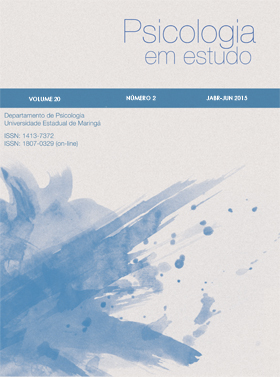PSYCHOSOCIOLOGICAL INTERVENTION: THE LISTENING CONSTRUCTION AND THE IMPLICATION IN ORGANIZATIONS
Abstract
Psychosociology offers a theoretical-methodological framework that is useful to the understanding and exploration of the relationships between the conflicts experienced in the current labor scenario, the suffering of the workers and the organizational contradictions. The purpose of this study is to understand how the work of listening in psychosociological interventions in organizations occurs and to elucidate the role of the implication of the intervener and the workers themselves in this context. As the authors of this work conduct psychosociological interventions, in public and private organizations, the data explored comes from their daily practices, from the ‘reminiscence method of the researchers’. In addition to the chronological time and making it possible to overcome the intervention by the strict way of objectifying the behaviors, in the organizations this work includes the construction of a listening that is fulfilled in two distinct moments: ‘of the reception and return to the historicity, and of the more directed elaborations to the productive activity of each worker’. Implication, on the other hand, does not represent a methodological obstacle to be neutralized, but a fundamental component to the consolidation of the bond with the workers is revealed, provided that it is recognized and duly worked out. Empathy, sensitivity, recognition of the other and their differences, overcoming ideal and crystallized models, as well as the implication in performing an effective work that opens space for critical questions, are fundamental ingredients of these interventions.
Downloads
References
Aubert, N., & Gaulejac, V. (1991) Le coût de l’excelence. Nouvelle Édition. Paris: Éditions du Seuil, 2007.
Barus- Michel, J. (2012) Implication, significations et engagement. In V. Gaulejac, F. Hanique, & P. Roche (Orgs.) La sociologie clinique: enjeux théoriques et méthodologiques. (pp. 218-225). Toulouse: Érès.
Devereux, G. (1967) De l’angoisse à la methode dans les sciences du comportement. Paris: Flammariom.
Dubost, J. (2001) Notas sobre a origem e evolução de uma prática de intervenção psicossociológica. In M., Machado, E. Castro, J. N. Araújo, & S. Roedel (Orgs.), Psicossociologia: análise social e intervenção (pp. 171-184). Belo Horizonte: Autêntica.
Dujarier, M. (2015) Le management désincarné: Enquête sur les nouveaux cadres du travail. Paris: La Découverte.
Enriquez, E. (1997) A organização em análise. (F. Rocha Filho, Trad.) Petrópolis: Vozes.
Enriquez, E. (2001) Da formação e da intervenção psicossociológicas. In M., Machado, E. Castro, J. N. Araújo, & S. Roedel (Orgs.), Psicossociologia: análise social e intervenção (pp. 211-236). Belo Horizonte: Autêntica.
Enriquez, E. (2009) As solidariedades estão voltando... Boletim da Universidade Federal de Minas Gerais. Belo Horizonte, UFMG, Acesso em 31/01/2019, Disponível em: https://www.ufmg.br/online/arquivos/012658.shtml.
Gaulejac, V (1987) La névrose de classe. Paris: Éditions Payot & Rivages, 2016.
Gaulejac, V. (1999) L’histoire en héritage: roman familial et trajectoire sociale. Paris: Éditions Payot & Rivages, 2012.
Gaulejac, V. (2011) Travail, les raisons de la colère. Paris: Éditions du Seuil.
Gaulejac, V. (2013) La direction de thèse: comment transmettre la clinique? In V. Gaulejac, F. Gius-Desprairies, & A. Massa (Orgs.) La recherche clinique en sciences sociales. Sociologie Clinique. Paris: Érès.
Gaulejac, V., Giust-Desprairies, F., & Massa, A. (Orgs.) (2013) La recherche clinique en sciences sociales. Sociologie Clinique. Paris: Érès.
Gaulejac, V., Hanique, F., & Roche, P. (Orgs.) (2012) La sociologie clinique: enjeux théoriques et méthodologiques. Toulouse: Érès.
Gaulejac, V., Giust-Desprairies, F., & Massa, A. (Orgs.) (2013) La recherche clinique en sciences sociales. Sociologie Clinique. Paris: Érès.
Gaulejac, V., & Legrand, M. (Orgs.) (2013) Intervenir par le récit de vie: entre histoire collective et hitroire individuelle. Sociologie Clinique. Paris: Érès.
Giust-Ollivier, A. (2006) Le psychosociologue face aux enjeux de la responsabilité. Nouvelle Revue de Psychosociologie. 2, 47-58.
Hashimoto, F. (2018) Escuta psicossociológica: o encontro com o/do indivíduo no espaço do trabalho. Revista Espaço Acadêmico, 209(XVIII), 56-64.
Pagès, M., Bonetti, M., Gaulejac, V., & Descendre, D. (1987) O poder das Organizações. (M. C. P. Tavares & S. S. Favatti, Trad.) São Paulo: Atlas, 1987.
Rizet, S. (2012) De la reconnaissance de l’implication du chercher à sa mise au travail. In V. Gaulejac, F. Hanique, & P. Roche (Orgs.) La sociologie clinique: enjeux théoriques et méthodologiques. (pp. 325-340). Toulouse: Érès.
Vandevelde-Rougale, A. (2017) La novlangue managériale: Emprise et résistance. Toulouse: Érès.
Copyright (c) 2020 Psicologia em Estudo

This work is licensed under a Creative Commons Attribution-NonCommercial 4.0 International License.
As opiniões emitidas, são de exclusiva responsabilidade do(s) autor(es). Ao submeterem o manuscrito ao Conselho Editorial de Psicologia em Estudo, o(s) autor(es) assume(m) a responsabilidade de não ter previamente publicado ou submetido o mesmo manuscrito por outro periódico. Em caso de autoria múltipla, o manuscrito deve vir acompanhado de autorização assinada por todos os autores. Artigos aceitos para publicação passam a ser propriedade da revista, podendo ser remixados e reaproveitados conforme prevê a licença Creative Commons CC-BY.
The opinions expressed are the sole responsibility of the author (s). When submitting the manuscript to the Editorial Board of Study Psychology, the author (s) assumes responsibility for not having previously published or submitted the same manuscript by another journal. In case of multiple authorship, the manuscript must be accompanied by an authorization signed by all authors. Articles accepted for publication become the property of the journal, and can be remixed and reused as provided for in theby a license Creative Commons CC-BY.
















